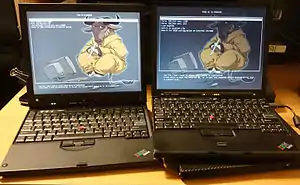Libreboot
Libreboot (briefly known as GNU Libreboot[4]) is a free-software project aimed at replacing the proprietary BIOS firmware contained by most computers. Libreboot is a lightweight system designed to perform only the minimum number of tasks necessary to load and run a modern 32-bit or 64-bit operating system.
 | |
 Two ThinkPad X60 laptops, which have been modified to use Libreboot as their BIOS firmware. | |
| Original author(s) | Leah Rowe |
|---|---|
| Developer(s) | The Libreboot project |
| Initial release | 12 December 2013 |
| Stable release | 20160907 (September 7, 2016) [±][1] |
| Repository | |
| Platform | IA-32, x86-64, ARMv7[2] |
| Type | Firmware |
| License | GNU GPLv3[3] |
| Website | libreboot |
Characteristics
Libreboot is established as a distribution of coreboot without proprietary binary blobs.[5][6] Libreboot is not a straight fork of coreboot; it re-bases on the latest coreboot as the upstream supplier, with patches merged upstream when possible. In addition to removing proprietary software, libreboot also attempts to make coreboot easy to use by automating the build and installation processes.[7][8]
The Libreboot project made possible the required modifications for completely free software variants of some ThinkPad, Chromebook, and MacBook laptops, as well as desktop, server, and workstation motherboards.[9][10] According to its own documentation, it can work with any Linux distribution that uses kernel mode setting (KMS) for the graphics, while Windows is not supported and its use is discouraged by Libreboot. Support for BSD is largely untested, with some successful reports while booting OpenBSD and NetBSD.[11]
History
Libreboot was originally launched by Leah Rowe[12] in 2013 to make a 100% free software version of coreboot by removing binary blobs included in the coreboot source code. Since February 2015 the project has been endorsed by Free Software Foundation (FSF).[13] The project became part of the GNU Project in May 2016.[14]
In September 2016 the lead developer announced that the project would leave the GNU Project and in January 2017, Richard Stallman announced that Libreboot was released from the GNU project.[15] The reason for the dispute was allegations from the lead maintainer that the FSF had fired a transgender employee because the employee reported gender harassment.[16][17] The FSF denied these allegations the same day.[18] In April 2017, the Libreboot project removed the accusations from their website, the lead developer apologized for what happened and control of the website was transferred to another contributor.[19] Three weeks later, a proposal to re-apply to become a GNU Project was published.[20] This proposition was not applied; as of 2019, libreboot is not under the umbrella of the GNU Project.[21]
Supported hardware
Libreboot supports the following hardware:[10][22]
- Server motherboards:
- Asus KFSN4-DRE
- Asus KGPE-D16
- Desktop motherboards and computers:
- Laptops:
- Apple MacBook 1.1
- Apple MacBook 2.1
- Asus Chromebook C201
- Lenovo ThinkPad X60
- Lenovo ThinkPad X60s
- Lenovo Thinkpad X60 Tablet
- Lenovo ThinkPad T60 (models with ATI GPUs cannot be used due to proprietary video BIOS)
- Lenovo ThinkPad X200
- Lenovo ThinkPad X200s (some exceptions)
- Lenovo ThinkPad X200 Tablet
- Lenovo ThinkPad R400
- Lenovo ThinkPad T400
- Lenovo ThinkPad T400s
- Lenovo ThinkPad T500
References
- "Libreboot release information". Libreboot. Retrieved 10 February 2021.
- "Coreboot ARM". coreboot. 15 October 2013. Retrieved 1 February 2014.
- "libreboot's COPYING file". notabug.org. Retrieved 16 September 2016.
- "GNU Libreboot". Retrieved 24 May 2016.
- "Libreboot". Free Software Foundation. Retrieved 31 July 2014.
- "Libreboot". Libreboot. Retrieved 31 July 2014.
- "About the libreboot project". Libreboot. Retrieved 25 April 2015.
- Gay, Joshua (4 August 2014). "Replace your proprietary BIOS with Libreboot". Free Software Foundation. Archived from the original on 16 July 2016.
- Gay, Joshua (9 October 2012). "Respects Your Freedom hardware product certification". Free Software Foundation. Retrieved 25 February 2015.
- "Hardware compatibility list". Libreboot. Retrieved 19 May 2016.
- "Answers to Frequently Asked Questions about libreboot". Libreboot.org.
- "Libreboot project contributors". libreboot.org. Archived from the original on 4 April 2017. Retrieved 14 May 2016.
- "Campaign for Free BIOS". 15 February 2015. Archived from the original on 15 February 2015.
- Larabel, Michael (19 May 2016). "Libreboot, Coreboot Downstream, Becomes A GNU Project". Phoronix. Archived from the original on 29 June 2018. Retrieved 19 May 2016.
- Stallman, Richard (5 January 2017). "Goodbye to GNU Libreboot". Archived from the original on 21 April 2018. Retrieved 5 January 2017.
- Zammit, Damien (18 September 2016). "Libreboot Screwup". zammit.org. Archived from the original on 29 June 2018. Retrieved 31 October 2016.
[the contributors] are not consulted about any of the views expressed on the libreboot.org website when they are hastily published by Leah Rowe.
- "Libreboot opposes the Free Software Foundation and GNU project". Libreboot. Archived from the original on 8 December 2016. Retrieved 22 September 2016.
- Sullivan, John (16 September 2016). "Free Software Foundation statement on 2016-09-16". Free Software Foundation. Archived from the original on 29 June 2018. Retrieved 24 September 2016.
- Rosenzweig, Alyssa; Rowe, Leah (2 April 2017). "Open Letter to the Free Software Community". Retrieved 24 April 2017.
- Larabel, Michael (22 April 2017). "Libreboot Is Now Considering Whether To RE-Join The GNU". Phoronix. Archived from the original on 1 December 2017. Retrieved 24 April 2017.
- It does not appear on the list of software maintained by GNU. https://www.gnu.org/software/software.html
- Larabel, Michael (28 June 2015). "Libreboot Now Supports An AMD/ASUS Motherboard". Phoronix. Archived from the original on 29 June 2018. Retrieved 14 July 2015.